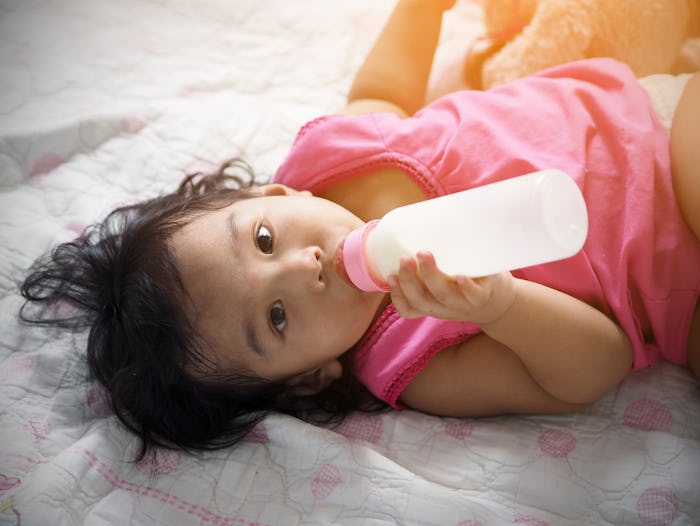Life
These Toddler Formulas & Milks Could Lead To Malnourishment Thanks To Their Labels, Report Says
Aside from the judgement and stigma surrounding the choice to formula feed, parents are facing a less publicized struggle when it comes to the food that they give to their babies. A recent study found that toddler formulas may not be as healthy as advertised. Misleading marketing campaigns prey on parents looking to provide the best nourishment they can to their children, with many labels making health claims that are not supported by science.
Researchers at the NYU College of Global Public Health and the Rudd Center for Food Policy & Obesity at the University of Connecticut determined that the labeling on formulas and milks marketed as "toddler drinks" can be confusing to parents, leading them to believe that they are healthy and necessary, according to Science Daily. The team of researchers visited stores and evaluated the labels of various toddler formulas and found that all brands made unsupported claims about nutrition and heath benefits.
In a study published in the journal Preventive Medicine, these researchers examined how U.S. policies and regulations could better enforce honesty on the part of the manufacturers. Researchers believe that guidance or regulations from the Food and Drug Administration could help to ensure that infants and young children are getting the nutrition that they need.
Lead researcher for the study Jennifer L. Pomeranz, JD, MPH, who is also an assistant professor of public health policy and management at the NYU College of Global Public Health told the NYU news team that none of the brands that they evaluated were completely honest on their labels:
All product labels made claims related to nutrition and health, and many made claims about expert recommendations that may lead caregivers to believe these products are necessary and healthy. In fact, they are not recommended by health experts, as there is no evidence that they are nutritionally superior to healthy food and whole milk for toddlers.
The kind of toddler drinks referenced in the study are those marketed as being for children from 9 months old to 3 years old and they come in two types: transition formulas for both infants and toddlers, and toddler milks for children 12 months old and older.
Despite being advertised as nutritious, Science Daily reported that they are "primarily composed of powdered milk, corn syrup or other added sweeteners, and vegetable oil, and contain more sodium and less protein than cow's milk." The World Health Organization stated that these drinks are "unnecessary" and "unsuitable," and the American Academy of Family Physicians has recommended that parents skip them in favor of cow's milk and a nutritious diet.
These toddler "formula" drinks may be part of the reason why more than half of U.S. babies are at risk for malnourishment, according to HuffPost. Several formula companies have come under fire in recent years for misleading marketing and potential salmonella contamination, including big names such as Nestle and Lactalis. Neither Nestle nor Lactalis immediately responded to Romper's request for comment.
Lucy Martinez Sullivan, executive director of 1,000 Days, a nonprofit organization dedicated to ensuring that children receive adequate nutrition in their first 1,000 days of life, said via an email statement that this mislabeled formulas prove there is a real need for stricter safety standards for baby formula, as well as a prioritization of maternal and child health:
We need to hold manufactures of infant formula more accountable for the basic safety and quality of their products. Parents need to be able to trust that the products that they’re buying are safe and meet the critical nutritional needs of their babies. Infancy is a period of tremendous vulnerability and it is unacceptable that there is not greater oversight of formula companies to prevent this from happening.
Much like Pomeranz and her team, Sullivan and 1,000 Days have called on the FDA to hold formula manufacturers accountable for the health claims that they make, as well as scientifically supported advertisements. Sullivan is looking for "the most rigorous standards for safety and quality," and I can't blame her.
With 85 percent of new mothers in the U.S. using formula, as reported by Parents, there are a lot of families relying on these products to deliver. Hopefully change is on the horizon for formula manufacturing and marketing, but in the mean time, studies such as this one empower parents to make more informed decisions about what they're feeding their children.
Check out Romper's new video series, Bearing The Motherload, where disagreeing parents from different sides of an issue sit down with a mediator and talk about how to support (and not judge) each other’s parenting perspectives. New episodes air Mondays on Facebook.
